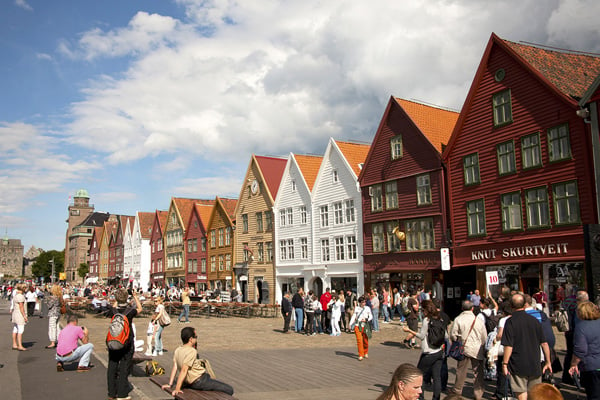Retire in Bergen Guide
Summary: Retire in Bergen with confidence, armed with the knowledge from our extensive guide. It covers critical considerations for retirees, from the cost of living and climate to housing, healthcare, and residency choices in Bergen. We also delve into the social and cultural scene, volunteering options, public transportation facilities, and the city's walkability, helping you make an informed decision.

Bergen, is a popular retirement destination for international retirees due to its high quality of life, stunning natural beauty, and friendly locals. The city offers a unique blend of urban amenities and outdoor activities, making it an ideal place for those seeking a balanced lifestyle in their golden years. However, retiring in Bergen also comes with its own set of challenges, such as the high cost of living and the need to learn a new language.
Living Expenses in Bergen
The cost of living in Bergen is relatively high compared to other cities in Norway. Housing, in particular, can be quite expensive, especially in the city center. However, the high living costs are offset by the excellent public services and amenities available to residents. Groceries and dining out can also be pricey, but retirees can save money by shopping at local markets and cooking at home.
Bergen's Climate
Bergen is known for its mild, maritime climate. The city experiences cool summers and mild winters, with temperatures rarely dropping below freezing. However, Bergen is also known as the rainiest city in Europe, with precipitation occurring on more than 200 days per year. Despite the frequent rain, the city's stunning natural beauty and clean, fresh air make it a pleasant place to live year-round.
Healthcare Facilities
Bergen is home to several top-notch hospitals and medical facilities, including Haukeland University Hospital, one of the largest and most advanced hospitals in Norway. The city also has a large number of general practitioners and specialists, ensuring that retirees have access to high-quality medical care.
Public Healthcare System
International retirees in Bergen are eligible to enroll in the Norwegian public healthcare system, which provides comprehensive coverage for a wide range of medical services. However, many retirees also choose to purchase private health insurance for additional coverage or for services not covered by the public system.
Residency Options
Retirees who wish to settle in Bergen can apply for a residence permit, which is typically granted for one year at a time and can be renewed. To qualify, retirees must demonstrate that they have sufficient financial resources to support themselves without relying on public funds.
Outdoor Activities and Parks
Bergen is surrounded by seven mountains, making it a paradise for outdoor enthusiasts. Retirees can enjoy hiking, fishing, boating, and skiing, among other activities. The city is also home to several beautiful parks, including Byparken, the city's main park, which is a popular spot for picnics and outdoor concerts.
Local Cuisine and Restaurants
Bergen's culinary scene is diverse and vibrant, with a strong focus on seafood. Popular local restaurants include Enhjørningen, known for its traditional Norwegian dishes, and Pingvinen, a cozy pub serving hearty comfort food. For a more upscale dining experience, retirees can visit Lysverket, which offers a modern take on Norwegian cuisine.
Language Learning Opportunities
While most Norwegians speak excellent English, learning Norwegian can enhance retirees' experience of living in Bergen. The University of Bergen offers Norwegian language courses for foreigners, and there are also several private language schools in the city.
Local Culture and Markets
Bergen's locals are known for their friendliness and hospitality. The city has a vibrant cultural scene, with numerous festivals, concerts, and art exhibitions throughout the year. Bergen's Fish Market is a must-visit, offering a wide range of fresh seafood and local produce.
Meeting People and Volunteering
Retirees can meet new people and get involved in the community by joining local clubs and organizations, such as the Bergen International Club. Volunteering is also popular, with opportunities available at local charities, museums, and community centers.
Housing Options
Most retirees in Bergen live in apartments or condos in the city center, which offers easy access to amenities and public transportation. However, those who prefer a quieter lifestyle may choose to live in the suburbs or in one of the city's surrounding villages.
Transportation in Bergen
Bergen has an excellent public transportation system, making it easy to get around without a car. The city is also very walkable, with many amenities located within a short distance of each other. For those who prefer to drive, car ownership is possible but can be expensive due to high taxes on vehicles.
About the Author
 Betsy Burlingame is the Founder and President of Expat Exchange and is one of the Founders of Digital Nomad Exchange. She launched Expat Exchange in 1997 as her Master's thesis project at NYU. Prior to Expat Exchange, Betsy worked at AT&T in International
and Mass Market Marketing. She graduated from Ohio Wesleyan University
with a BA in International Business and German.
Betsy Burlingame is the Founder and President of Expat Exchange and is one of the Founders of Digital Nomad Exchange. She launched Expat Exchange in 1997 as her Master's thesis project at NYU. Prior to Expat Exchange, Betsy worked at AT&T in International
and Mass Market Marketing. She graduated from Ohio Wesleyan University
with a BA in International Business and German.
Some of Betsy's articles include 12 Best Places to Live in Portugal, 7 Best Places to Live in Panama and 12 Things to Know Before Moving to the Dominican Republic. Betsy loves to travel and spend time with her family. Connect with Betsy on LinkedIn.




